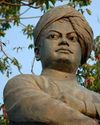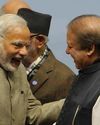Vivekananda believed that Religion should be subjected to scientific methods of investigation. The third and concluding part of our series on the Swami and his views on science.

WHEN IT COMES to the relationship between science and spirituality, the prevalent view among most sceptical and materialistic scientists regards spiritual wisdom and religious scriptures not just as non-science, but as essentially nonsense. Naturally, Swami Vivekananda’s or any other religious figure’s views on science would be suspect, unless and until they are corroborated by “hard” data. For a typical proponent of such an “anti”-view, we might turn to Richard Dawkins who considers religion as delusion made up of a “fixed false belief”.
A tempting, but arguably disappointing “middle ground” seemed to be offered by the celebrated evolutionary biologist Stephen Jay Gould (1941-2002). To avoid conflict between science and religion, he proposed a clear demarcation of each domain, labeling them both with the impressive sounding term “magesteria” to legitimate their separate but apparently equal spheres. These magesteria, separate fields of authority, do not overlap, as indicated by the principle commonly known as NOMA, or “non-overlapping magisteria.” In the essay that popularised the expression, “Non Overlapping Magisteria”, Gould writes:
“The net of science covers the empirical universe: what is it made of (fact) and why does it work this way (theory). The net of religion extends over questions of moral meaning and value. These two magisteria do not overlap, nor do they encompass all inquiry (consider, for starters, the magisterium of art and the meaning of beauty). To cite the arch cliches, we get the age of rocks, and religion retains the rock of ages; we study how the heavens go, and they determine how to go to heaven.”
This story is from the April 2017 edition of Swarajya Mag.
Start your 7-day Magzter GOLD free trial to access thousands of curated premium stories, and 9,000+ magazines and newspapers.
Already a subscriber ? Sign In
This story is from the April 2017 edition of Swarajya Mag.
Start your 7-day Magzter GOLD free trial to access thousands of curated premium stories, and 9,000+ magazines and newspapers.
Already a subscriber? Sign In

Refuging Progess
There is a well-orchestrated global conspiracy to deny scientific and technological developments from the West to Third World countries.

The Monk Of Science
Vivekananda believed that Religion should be subjected to scientific methods of investigation. The third and concluding part of our series on the Swami and his views on science.
The Next Step
Indian technical manpower can be trained for high-value-added emerging services in the era of mass commoditisation of hardware.
The Threat Of Autarchy
The force of globalisation is an irreversible reality, and it is countries like India and China that will nurture it going forward.

Neanderthals: The Womb Of Caves
Recent discoveries indicate that Neanderthals may have had a rich inner life, including symbolic thought. Indeed, they may have been the progenitors of human religions.

Getting India's World Right
Incremental concessions will get India nowhere with Pakistan and China. What we need is a classically conservative foreign policy, based on realism.

The Hesitant Orbit
In order to march boldly ahead into the deep space, New Delhi must work towards building a station, boost its techno-economic planning and use the Indian Space Research Organisation smartly.

Nudges And Narratives
The debate surrounding Sanjay Leela Bhansali’s Padmavati brings India a complex network of portraits within a cultural world-system.

The Spell Of Specialisation
THE INDIAN ADMINISTRATIVE SERVICE NEEDS AN URGENT REJIG. THE KEY TO SPEED AND EFFICIENCY LIES IN PUTTING AN END TO A GENERALIST APPROACH AND IN GOING FOR A NEW SERVICE.
The Great Gamble
With demonetisation, the prime minister has taken a huge risk— both economic and political. He must succeed, because this move could transform both our economy and our society.